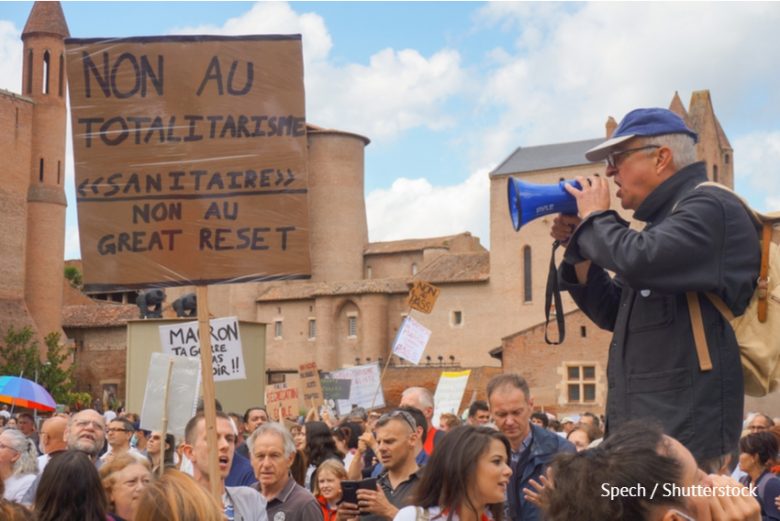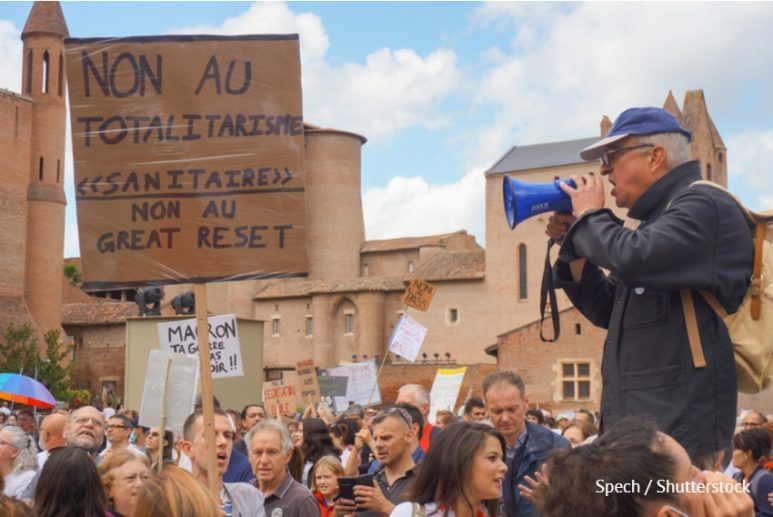Marianna Karakoulaki
This article was first published on COVINFORM
“At the Nuremberg trials, the doctors and nurses stood trial and they hung. If you are a doctor or a nurse, now is the time to get off that bus. Get off it and stand with us, the people, all around the world they are rising,” proclaimed Kate Shemirani, one of the UK’s most prominent anti-vax conspiracists, during a protest in July 2021 at Trafalgar Square, London. By the time Shemirani, a former nurse, made these comments, she had already been suspended by the Nursing and Midwifery Council for spreading misinformation regarding COVID-19. Shemirani’s journey to fame includes antisemitic dog whistle, comparisons of the National Health Service to Auschwitz and dissemination of Nazi imagery on social media.

Kate Shemirani’s case is not an isolated incident. In a report produced by Media Diversity Institute as part of the Get The Trolls Out! (GTTO) project and in collaboration GTTO partners Amadeu Antonio Stiftung (Germany), Center for Independent Journalism (Hungary), European Network on Religion and Belief (Belgium), European Union of Jewish Students (Belgium), Karpos (Greece), LICRA (France) and ‘NEVER AGAIN’ Association (Poland), we observed that antisemitic narratives have found fertile ground within anti-vax conspiracy theories throughout Europe. Our media monitoring focused on Facebook and Twitter posts from March 2021 until August 2021. In some cases, the media monitoring period had to be extended. Some other platforms, such as YouTube, were also monitored due to their prominence among anti-vaxxers. In some countries, antisemitism is more subtle than in others; however, all countries share one old yet prominent antisemitic conspiracy theory: a powerful elite of Jewish people wants to take over the world through the vaccine.
Our research has identified six key points:
- It is common for anti-vaxxers to use Holocaust comparisons and consider themselves the ‘new Jews’.
- Variation of established antisemitic conspiracy ideologies, such as ‘The Great Reset’ and the ‘New World Order’ play a significant role and are seen in several countries.
- Antisemitic dog whistle, or coded language, using the words such as ‘globalists’ instead of ‘Jews’, is present throughout Europe.
- Feeling or causing fear is one of the main methods of uniting conspiracists.
- Victim mentality is common among anti-vaxxers.
- Connections to the far right are present in several countries.
Holocaust comparisons and the ‘new Jews’ framing contradicts more established antisemitic ideologies such as ‘The Great Reset’ and the ‘New World Order’ which allege that a Jewish elite will take control of the world. However, both narratives are prominent in the countries under research and have been used interchangeably by established anti-vax figures such as Kate Shemirani. For example, in the same anti-vax protest, one might hear about a secret elite (often an antisemitic dog whistle to refer to Jews) plotting to dominate, and at the same time, anti-vax protesters might be wearing the Star of David on their arms and proclaim that they are the victims of a new genocide, a Holocaust.
This brings us to the next two narratives we have identified: fear and victim mentality. Anti-vaxxers see themselves as victims. Everyone is against them, and every governmental policy is designed to cause them harm. They are afraid of dying from something they do not understand, but they are also scared of losing their special characteristic. In some cases, that characteristic is connected to their national identity. Such conspiracies are widespread in countries such as Greece, where the nationalist element is shared among conspiracist communities and is also connected to Orthodox Christianity. Anti-vaxxers feel they are in a constant hunt and that everyone conspires against them. In fact, academic literature has found connections between those who suffer from paranoia – in its broader and in some cases non-clinical sense – and conspiracy theories.
Finally, far-right elements are present in several countries. This key point does not mean that COVID-19 conspiracy theories are exclusive to the far right. Quite the opposite. COVID-19 conspiracies have successfully united all edges of the political spectrum, and this is seen in protests in several European countries. However, antisemitic tropes are central to the far-right agenda who ‘are exploiting these circumstances and the power of the social media to fuel anti-Jewish hatred’.
Antisemitism and conspiracy theories have been going hand in hand for years. The pattern is similar from the Protocols of the Elders of Zion to the Great Reset. What has changed from then to now is social media’s central role in the way they spread. Big Tech has certainly made efforts to tackle COVID-19 misinformation, however, the actions they have taken do not seem to have stopped the way conspiracy theories spread. By looking at the results of our partners’ media monitoring research, one thing is striking. Although antisemitic content in anti-vax conspiracies seems to have reduced in certain countries due to moderation efforts, in others, it is still present and spreads uncontrollably. What contributes to this is an extensive reliance on social media algorithms which fails to identify language-specific hate speech and antisemitic dog whistle. For this reason, the report includes nine recommendations:
- Further inter-sector cooperation between CSOs, tech companies and lawmakers.
- Improved social media moderation for health misinformation.
- Consistent enforcement for existing hate speech and COVID-19 policies by tech companies.
- Expert training for moderators.
- Moderation on Facebook private groups.
- Deplatforming of conspiracists and antisemites.
- Common strategies and collaboration among tech companies.
- Media and information literacy education.
- Strengthen collaboration among CSOs.
Online hate always finds a way to influence people susceptible to conspiracy theories. We are aware that social media will not become free from hate even if all of these recommendations are taken into account. However, we believe that they can be a stepping stone into creating less hateful online spaces without restricting freedom of speech and freedom of information.
This blog is based on the results of ‘Antisemitism and anti-vax discourse in Europe: A report on conspiracy ideologies and anti-Jewish hatred on Facebook and Twitter’.
Photo Credits: Spech / Shutterstock

